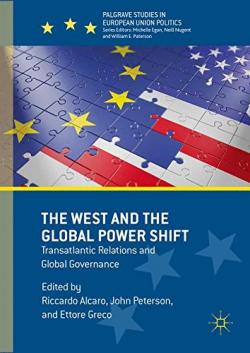The West and the Global Power Shift. Transatlantic Relations and Global Governance

This book assesses the state of transatlantic relations in an era of emerging powers and growing interconnectedness, and discusses the limits and potential of transatlantic leadership in creating effective governance structures. The authors first resort to theory and history to understand the transatlantic relationship. They then consider the domestic and systemic factors that might set the relationship between the United States and Europe on a different path. Finally, the authors locate the potential for transatlantic leadership in the context of the global power shift. The world of the 21st century displays different power configurations in different policy domains. This changing structure of power complicates the exercise of leadership. Leadership requires not only greater power and authority, but also persuasion, bargaining and moral suasion, all necessary strategies to build coalitions and manage conflicts between great powers.
This book collects together revised and updated versions of some of the best-quality pieces of analysis produced by the Transworld research team, along with contributions from two leading US-based experts: Daniel S. Hamilton of Johns Hopkins University and Jolyon Howorth of Yale University.
Notes on Contributors, p. xi-xii
Abbreviations, p. xiii-xvi
List of Tables, p. xvii
1. Introduction: Where Things Stand and What Happens Next, John Peterson, p. 1-18
Part I. Theory and History of Transatlantic Relations
2. The Transatlantic Security Community: Erosion from Within?, Thomas Risse, p. 21-42
3. Multipolarity, Multilateralism and Leadership: The Retreat of the West?, John Peterson, Riccardo Alcaro, and Nathalie Tocci, p. 43-73
4. The Historical Evolution of the Transatlantic Partnership, Maria G. Cowles and Michelle Egan, p. 75-97
Part II. Domestic and Systemic Drivers of Change
5. All Roads Don’t Lead to Brussels (But Most Do): European Integration and Transatlantic Relations, John Peterson, p. 101-125
6. The Domestic Setting of American Approaches to Europe, Daniel S. Hamilton, p. 127-145
7. Sustained Collective Action or Beggar My Neighbour? Europe, America and the Emerging Powers, Jolyon Howorth, p. 147-176
Part III. Transatlantic Relations and Global Governance
8. Competitive Interdependence: Transatlantic Relations and Global Economic Governance, Chad Damro, p. 179-196
9. The Paradoxes of the Liberal Order: Transatlantic Relations and Security Governance, Riccardo Alcaro, p. 197-219
10. The Responsibility to Protect in Libya and Syria: Europe, the USA and Global Human Rights Governance, Nathalie Tocci, p. 221-246
11. The Past, Present and Future of Transatlantic Cooperation for Climate Governance, Christine Bakker and Francesco Francioni, p. 247-269
12. Conclusions: Beyond Resilience. The Case for Transatlantic Leadership, Riccardo Alcaro and Ettore Greco, p. 271-288
Index, p. 289-296


